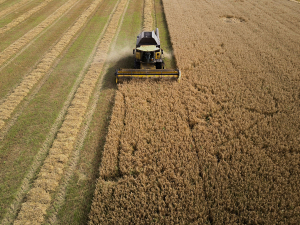The arable sector will feel the impacts of cuts to forecast milk payments to New Zealand’s dairy farmers, says Federated Farmers arable vice-president grains, Andrew Darling.
The July Arable Industry Marketing Initiative (AIMI) survey, released yesterday, shows sown and intended sowing feed wheat and feed barley crops are down 6% and 15% respectively on last season.
Darling says that while there’s still a reasonable market for feed grain in the North Island, it’s difficult to transport South Island grain across the Cook Strait at a reasonable price, especially considering it will be in competition with Australian grain.
“It’s an expensive bit of water that splits our country in half, unfortunately,” Darling says.
Sowings and intentions for malting barley – the barley used by breweries – is up 77% on the 2023 harvest, but the hectares involved are still relatively small (from 9,105ha to 15,569ha).
Overall, 2023 harvest data shows yields were up 6% over the six malting/milling and feed crops. The area harvested, 96,022ha, was similar to 2022 (up 1%).
The net result was a 7% increase in total tonnage compared to last season, the AIMI report found.
Feed wheat yields were up an estimated 1%, feed barley yields up 11%, milling wheat yields up 4%, malting barley yields up 6%, milling oats yields up 15%, and feed oats yields down 2% compared to last season.
The estimated 2023 final tonnage of milling wheat at 113,700 tonnes is up 44% compared to last year’s harvest, “but we knew what was coming,” Darling says. “The weather last year was really poor.”
The amount of unsold milling wheat at 1 July this year was 26,700 tonnes (24%), higher than at 1 July 2022 (15,500t).
A large amount of the sold feed wheat (58%) was still stored on farm.
“A good amount of this will likely have been at a good contract price for the grower, and the merchant will be starting to move that grain now,” says Darling.
“Dairy farmers, given the outlook, probably aren’t as keen to fill feed silos at the moment as they have been in past seasons,” he adds.
Two-thirds of the estimated 289,100 final tonnage of feed barley has been sold, with 38% of that grain still stored on farm.
The amount of unsold feed barley was 97,000 tonnes (34%), considerably higher than at 1 July last year (59,300t).
Growers in the North Island and in Southland are looking forward to better spring conditions after a wet autumn and winter, Darling says.
There was plenty of winter rain in Canterbury too but reports from that region are that most autumn crops have established well.



















